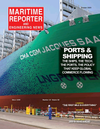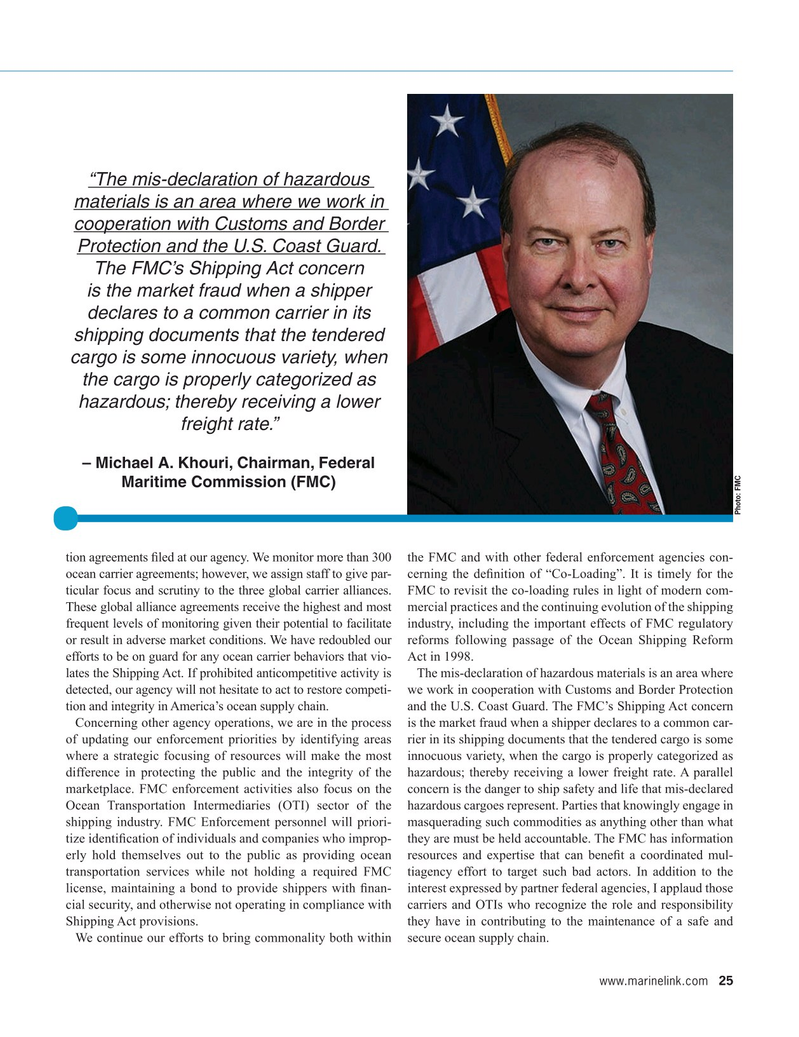
Page 25: of Maritime Reporter Magazine (October 2020)
Shipping & Port Annual
Read this page in Pdf, Flash or Html5 edition of October 2020 Maritime Reporter Magazine
“The mis-declaration of hazardous materials is an area where we work in cooperation with Customs and Border
Protection and the U.S. Coast Guard.
The FMC’s Shipping Act concern is the market fraud when a shipper declares to a common carrier in its shipping documents that the tendered cargo is some innocuous variety, when the cargo is properly categorized as hazardous; thereby receiving a lower freight rate.” – Michael A. Khouri, Chairman, Federal
Maritime Commission (FMC)
Photo: FMC tion agreements ? led at our agency. We monitor more than 300 the FMC and with other federal enforcement agencies con- ocean carrier agreements; however, we assign staff to give par- cerning the de? nition of “Co-Loading”. It is timely for the ticular focus and scrutiny to the three global carrier alliances. FMC to revisit the co-loading rules in light of modern com-
These global alliance agreements receive the highest and most mercial practices and the continuing evolution of the shipping frequent levels of monitoring given their potential to facilitate industry, including the important effects of FMC regulatory or result in adverse market conditions. We have redoubled our reforms following passage of the Ocean Shipping Reform efforts to be on guard for any ocean carrier behaviors that vio- Act in 1998.
lates the Shipping Act. If prohibited anticompetitive activity is The mis-declaration of hazardous materials is an area where detected, our agency will not hesitate to act to restore competi- we work in cooperation with Customs and Border Protection tion and integrity in America’s ocean supply chain. and the U.S. Coast Guard. The FMC’s Shipping Act concern
Concerning other agency operations, we are in the process is the market fraud when a shipper declares to a common car- of updating our enforcement priorities by identifying areas rier in its shipping documents that the tendered cargo is some where a strategic focusing of resources will make the most innocuous variety, when the cargo is properly categorized as difference in protecting the public and the integrity of the hazardous; thereby receiving a lower freight rate. A parallel marketplace. FMC enforcement activities also focus on the concern is the danger to ship safety and life that mis-declared
Ocean Transportation Intermediaries (OTI) sector of the hazardous cargoes represent. Parties that knowingly engage in shipping industry. FMC Enforcement personnel will priori- masquerading such commodities as anything other than what tize identi? cation of individuals and companies who improp- they are must be held accountable. The FMC has information erly hold themselves out to the public as providing ocean resources and expertise that can bene? t a coordinated mul- transportation services while not holding a required FMC tiagency effort to target such bad actors. In addition to the license, maintaining a bond to provide shippers with ? nan- interest expressed by partner federal agencies, I applaud those cial security, and otherwise not operating in compliance with carriers and OTIs who recognize the role and responsibility
Shipping Act provisions. they have in contributing to the maintenance of a safe and
We continue our efforts to bring commonality both within secure ocean supply chain.
www.marinelink.com 25
MR #10 (18-33).indd 25 10/6/2020 8:46:57 AM

 24
24

 26
26
